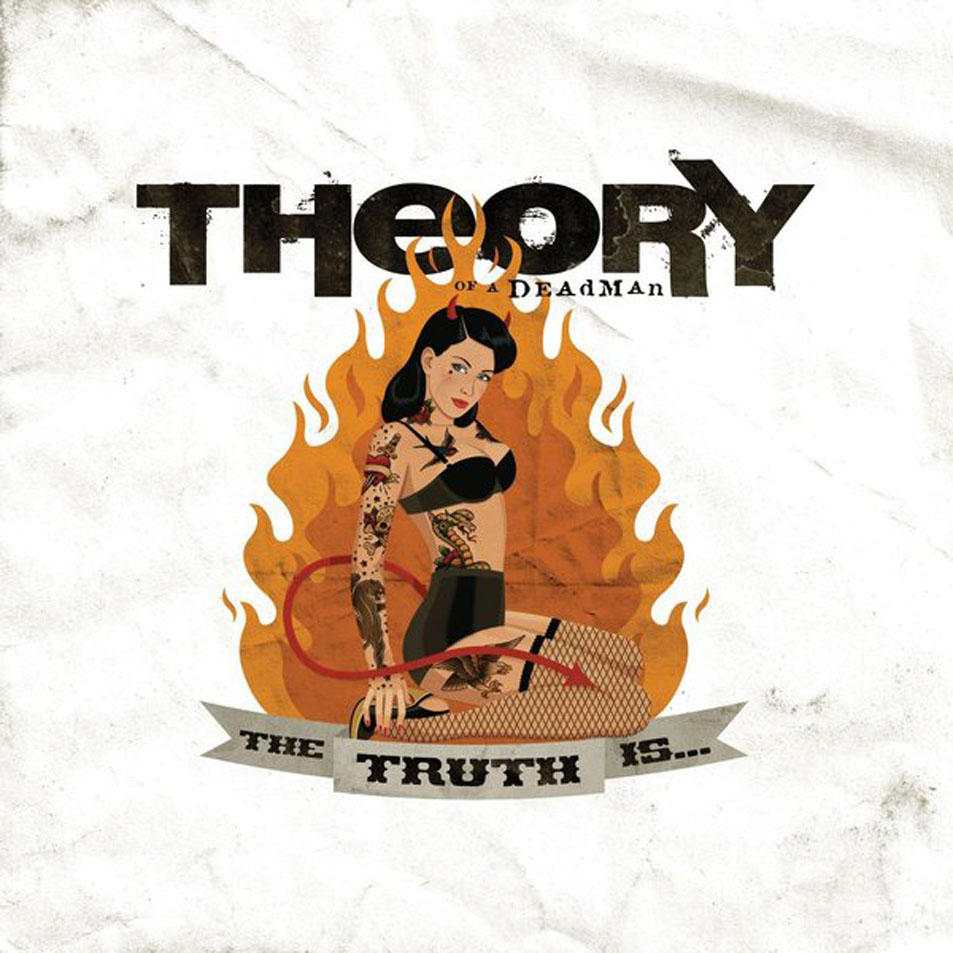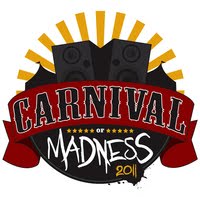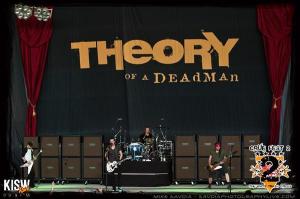bill bodkin profiles one of the bands in the hard rock scene …
Since the early 2000s, the Canadian-born Theory of a Deadman have been the banner-carriers of the hard music world. It’s their Southern rock-influenced Molotov cocktail of punch-you-in-the-mouth riffs, thunderous bass lines and the vicious asphalt tinged growls of Tyler Connolly that have made them beloved to those who throw the devil horns in the air.
Yet their mainstream appeal comes from their ability to show a more melodic side and we don’t mean sentimental in a monster ballads way. We’re talking more of a “Tuesday’s Gone” Lynrd Skyrnd-esque whiskey-soaked sentimentality about lost love and failed relationships.
On their new album The Truth Is …, this sentimental side is highly prevalent. Connolly’s asphalt-tinged growl morphs into a very melodic, soulful and emotional set of pipes. His voice, mirrored by the band’s sound on these tracks hint at a little more country than hard rock. The track “Easy To Love You” exemplifies this best. It’s actually a sweet song, something you could play for your lady on a romantic summer’s night.
And it’s this new style that makes the hard rock tracks on The Truth Is … stand out even more. This is made obvious when you give the album a second listen as you get through a plethora of more slow tempo, sentimental songs and then you restart the album with the anthemic “Lowlife.”
“Lowlife” is the stand-out single off this album. An ode to the white trash, with its references to Fieros, Joe Dirt and being eternally wasted, this track should make rock fans roll their eyes in disgust. Like I said, it should. Yet, Theory Of A Deadman has this way to create big hooks and fist in the air anthems that no matter the subject, you’ll find yourself singing along, bopping your head as you drive down the highway.
In the end, if you’re one of those hard rock fans who love a good sing-a-long, some rage-fueled rock and still have some room for some slower, more crafted and emotional songs, you need to be checking out The Truth Is …
On the heels of the album’s release, Pop-Break’s Bill Bodkin interviewed Connolly about the hard rock scene, filming a video with Donal Logue and so much more …

Pop-Break: The new record is out. How’s the reception been from the fans and the critics?
Tyler Connolly: It’s been great. I think we’ve been getting most of the rock audience buying the record the first week — which is cool. This is our loyal fan base we’ve been growing over the last 10 years. It’s exciting, man. All the feedback’s been great. I think we’ve found our place in rock ‘n’ roll, Theory Of A Deadman, finally. We’ve struggled not within the industry but within ourselves to figure out who we are. It’s kind of like high school — you’re just trying to fit in. I think we finally found our place.
PB: Going off that, what do you think your place is in the modern rock world?
TC: We’re probably the kids in the smoke pit, smoking doobs between classes. That’s probably where we fit in. [laughs] The kids that are skipping class, telling the teachers to fuck off. [laughs] I don’t know, it’s more of a metaphoric thing; maybe to fit in is not to fit in. We were playing a festival a while back and Dave [Brenner] our guitar player was like, “I don’t know if we fit in here anymore.” And I was like, “Yeah I don’t know either.” [We were playing with] all these bands, these great bands — Bullet For My Valentine, Zakk Wylde, Avenged Sevenfold, Sevendust, but they’re so much heavier than we are. Not to say we aren’t a rock band or they’re not, either. It’s just we stand out from all these bands, but definitely in a good way.
When he [Dave] first made that statement, I was like, “Yeah dude … shit … are we heavy enough to hang with these bands?” Then I started to think to myself that this is a good thing. You don’t realize it when you’re in high school that it’s cool to stand out. When you’re a kid, you want to fit in, you want to be like everyone else. Same clothes, same haircuts, listen to the same music. Then when you grow up, you look back and think. “I wish had done something to stand out back then.” So I think that’s where we fit in now. We’re like the redheaded stepchild of rock ‘n’ roll, and we’ve figured out it’s cool to be that.
PB: I’ve been listening to you guys since “Nothing Can Come Between US,” but I noticed on this record there’s more of a country swagger to it. Not in terms of “new country,” but kind of a Johnny Cash feel to it. Do you feel this is true?
TC: We’ve always had the Southern rock thing. “Nothing Can Come Between Us” even had a Southern feel to it. I think maybe it’s standing out a little more — it’s a little fresher than before. We’ve always had a lot of lap steel and slide guitars in our songs. We’re big Southern rock enthusiasts, so there’s always a little bit of that in our music.
PB: How do you feel this album stands out from the rest of your catalog?
TC: Lyrically, it’s about a certain period of time I was in last year. A lot of the comments are about the lyrics are how it seems to be about one person. [laughs] It kinda is. It’s very fresh and I think that the material great. It’s right where we need to be. I’ve always looked for some sort of comparison between me and the audience and to be one of the audience. There’s no better comment to get back from the fans than the songs relate to them as if I were them. And that’s really cool. I think there’s maybe one song [on the album] that people can’t relate to, and that’s called “What Was I Thinking?”
PB: Why don’t you think people could relate to it?
TC: “What Was I Thinking?” was from more of a personal point of view of me being on the road and living the life. I even say my name Tyler in it, so it’s taken from my point of view. I mean, they can relate to it on the subject. It’s about fucking up and ruining the one opportunity you had with somebody because you’re enjoying life so much. People get that. I just literally take it from my point of view so people will be like, “Oh, Tyler is talking about himself.” Because the rest of the songs. I am talking about myself, but it’s generally kind of for everyone.
PB: When it comes to writing, you say you have an everyman approach. Who are some of your lyrical inspirations? Who were some musicians that you felt spoke to you through their lyrics and those who made you want to write lyrics like them?
TC: I grew up a guitar player, so I always had a tough time with lyrics. It took me a long time to be really good at it. I think a lot of my lyrical heroes sang about stuff I had no idea what the hell they were talking about. I always liked Scott Weiland, Robert Plant, Bono, but they were very metaphoric singers. I like Jerry Cantrell, but a lot of their writing, it’s not an open book, you just can’t read it. He [Cantrell] is singing about having a hard time dealing with heroin but in metaphor. So it’s ironic, some of my favorite lyrics, you read through a few times and you have no idea what they’re talking about. That’s how I kinda started out, writing songs and have people decipher what I was talking about. They would ask me what I was singing about, and I’d say, “No, it’s really cool this represents the blaaah and this whaaaa.”
Now, I’ve toned it down and make it a lot easier for the listeners rather than [the lyrics] be my own cathartic piece and just make the song my therapy. It’s a song like “Lowlife” — the song couldn’t be simpler. There’s nothing you couldn’t understand. “What’s the song about?” It’s about being a lowlife and having fun. There’s no real underlying Bob Dylanisms in there.
PB: I watched the video for “Lowlife” and one of my favorite character actors, Donal Logue, is in it. Talk about concept of the video came from, and how was it working with Donal Logue?
TC: He was a great, really down-to-earth and he really fit so perfectly to be the lowlife character. He just showed up and looked like the guy. Pretty much wearing what he was in the video and he was just super nice.
The concept I think the director just came up with the treatment and we just had a discussion over the phone and brought up some different ideas. The record label was on the phone with the director and the band and I was like, “Well, you got this guy in the trailer — let’s just blow the trailer up at the end of the video. Let’s just have this huge fire ball and we just walk away like the Rat Pack in Ocean’s 11. It’d be really cool.” Of course, the director was like, “It’s great! It’s great! Let’s do it!” And the label was like, “Ugggh.” And I was like, “Yes!” So that was my contribution to it — blowing the trailer up. And we were pretty excited that they went along with it and paid for it because it was so ridiculous and unnecessary. It just made the video.
PB: So the explosion was a live take?
TC: Yeah, that was all live. No CGI. It was pretty scary. We were about 10 feet from the trailer, and they were like, “We can’t blow it until you’ve crossed this safety line.” So we had to go through it a few times with safety tests. You weren’t allowed to flinch or turn around. It was like A-Team! It was one of the funnest videos to shoot, not just because of Donal, but it was just fun.
I love when directors shoot the band separate and put them in individual rooms. So you don’t have to do the song 800 times in a row. It’s always, “Okay, we’re going to shoot the bass player, but Tyler we can still see your shoulder, so you’re going to have to stay in the shoot.” They shot me first and I was finished by 10 a.m., and I was like, “Nice! Sweet, see you later!”
PB: You guys are headlining the Carnival of Madness Tour with two bands you’ve toured with a lot — Black Stone Cherry and Alterbridge. Why is it that you seem to hit the road with these bands more than others?
TC: They’re great both bands, and Black Stone has been around almost as long as us. We’re all a part of the same management team, so it’s easy to put us together on the road. But it turns out they’re great guys — it would suck if they were a bunch of douche bags. It’s cool to see your friends on the road and tour with your friends and not some band that you have nothing in common with.
PB: We touched on this before, but you guys came up in the early 2000s, when hard rock was still charting high, had a lot of radio time. Now it’s country, hip-hop and pop music dominating the charts. How has it been for you guys as a band to be in the hard rock scene and find success, find a new audience?
TC: Well, I think the problem with rock now is people aren’t trying very hard. Rock will never die — it’s like the cockroach of the music industry. We keep getting squashed and squashed.
A lot of it has to do with the artists,.I think they expect too much from their label. Why expect your label to make you rock stars? Do it yourself. And I think we’re losing the rock stars. We don’t have bands like The Rolling Stone or … Motley Crue is a great example. They’re a glam rock band. I don’t know if they want to be called that, but that’s what we they, but they’ve been so successful and still are to this day. They work so hard not just on touring, they work hard on being relevant with their fans and with today. Nikki Sixx is kind of a genius when it comes to the live show. They always spend a lot of money on touring and making sure they’re still rockstars.
Dave Grohl, I think, said he didn’t want to go see a band where the lead singer looked like the gardener. It’s true, there’s so many bands onstage that just look like a bunch of dudes that work at Wal-Mart. I think a lot of that emo stuff or something like that helped bring about the anti-rock star age about. Now that that’s gone there’s no more rockstars. No one wants to put posters on their walls or care what band look like. There’ll be a hit song on the radio and they’ll be like, “Do you know what they look like?” And it’s like. “Uhhh … no.”
So I always blame ourselves. We need to make bigger and better ways to make it cooler for people come out to show and buy records.







